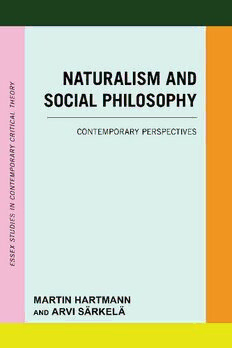
Naturalism and Social Philosophy: Contemporary Perspectives PDF
284 Pages·2023·2.122 MB·English
Most books are stored in the elastic cloud where traffic is expensive. For this reason, we have a limit on daily download.
Preview Naturalism and Social Philosophy: Contemporary Perspectives
Description:
Can societies fall ill? Can institutions die, or social practices degenerate? Must social norms be embodied? To what extent is social action habitual? Is social life part of nature or does it transcend it? This book explores the meaning and many facets of naturalism in social philosophy. It investigates the consequences of concepts such as 'second nature' and 'forms of life' for social philosophy. It analyses the ways in which social action, gender, work and morality are embodied. It surveys the conceptions of nature at play in social criticism. It provides students and experts of social philosophy with both an overview and critical analyses of the many facets of naturalism in social philosophy from Hegel to contemporary critical theory.
See more
The list of books you might like
Most books are stored in the elastic cloud where traffic is expensive. For this reason, we have a limit on daily download.
